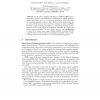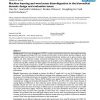17 search results - page 2 / 4 » A Comparison between Supervised Learning Algorithms for Word... |
BMCBI
2010
13 years 5 months ago
2010
Background: Word sense disambiguation (WSD) algorithms attempt to select the proper sense of ambiguous terms in text. Resources like the UMLS provide a reference thesaurus to be u...
ACL
2003
13 years 6 months ago
2003
A central problem of word sense disambiguation (WSD) is the lack of manually sense-tagged data required for supervised learning. In this paper, we evaluate an approach to automati...
CORR
2000
Springer
13 years 5 months ago
2000
Springer
In this paper Schapire and Singer's AdaBoost.MH boosting algorithm is applied to the Word Sense Disambiguation (WSD) problem. Initial experiments on a set of 15 selected polys...
BMCBI
2006
13 years 5 months ago
2006
Background: Word sense disambiguation (WSD) is critical in the biomedical domain for improving the precision of natural language processing (NLP), text mining, and information ret...
CICLING
2010
Springer
14 years 4 days ago
2010
Springer
Recent research works on unsupervised word sense disambiguation report an increase in performance, which reduces their handicap from the respective supervised approaches for the sa...


